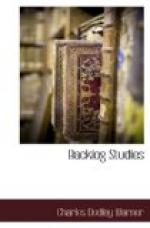The mistress. You don’t mean to say that George Eliot, and Mrs. Gaskell, and George Sand, and Mrs. Browning, before her marriage and severe attack of spiritism, are less true to art than contemporary men novelists and poets.
Herbert. You name some exceptions that show the bright side of the picture, not only for the present, but for the future. Perhaps genius has no sex; but ordinary talent has. I refer to the great body of novels, which you would know by internal evidence were written by women. They are of two sorts: the domestic story, entirely unidealized, and as flavorless as water-gruel; and the spiced novel, generally immoral in tendency, in which the social problems are handled, unhappy marriages, affinity and passional attraction, bigamy, and the violation of the seventh commandment. These subjects are treated in the rawest manner, without any settled ethics, with little discrimination of eternal right and wrong, and with very little sense of responsibility for what is set forth. Many of these novels are merely the blind outbursts of a nature impatient of restraint and the conventionalities of society, and are as chaotic as the untrained minds that produce them.
Mandeville. Don’t you think these novels fairly represent a social condition of unrest and upheaval?
Herbert. Very likely; and they help to create and spread abroad the discontent they describe. Stories of bigamy (sometimes disguised by divorce), of unhappy marriages, where the injured wife, through an entire volume, is on the brink of falling into the arms of a sneaking lover, until death kindly removes the obstacle, and the two souls, who were born for each other, but got separated in the cradle, melt and mingle into one in the last chapter, are not healthful reading for maids or mothers.
The mistress. Or men.
The fire-tender. The most disagreeable object to me in modern literature is the man the women novelists have introduced as the leading character; the women who come in contact with him seem to be fascinated by his disdainful mien, his giant strength, and his brutal manner. He is broad across the shoulders, heavily moulded, yet as lithe as a cat; has an ugly scar across his right cheek; has been in the four quarters of the globe; knows seventeen languages; had a harem in Turkey and a Fayaway in the Marquesas; can be as polished as Bayard in the drawing-room, but is as gloomy as Conrad in the library; has a terrible eye and a withering glance, but can be instantly subdued by a woman’s hand, if it is not his wife’s; and through all his morose and vicious career has carried a heart as pure as a violet.
The mistress. Don’t you think the Count of Monte Cristo is the elder brother of Rochester?
The fire-tender. One is a mere hero of romance; the other is meant for a real man.




